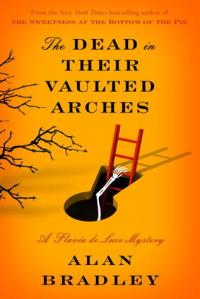 Flavia de Luce, we meet again. I’ve been nuts about the magnificently precocious 12 year old amateur sleuth ever since the opening pages of the first book, when she looked at the cook employed by her father at their huge country house and thought “will no-one rid us of this turbulent pastry chef?” She is an absolute delight of a character, though the series has shown signs of stalling, as Flavia continues to be the same age and remain in the same location, edging ever closer to Midsomer Murders territory.
Flavia de Luce, we meet again. I’ve been nuts about the magnificently precocious 12 year old amateur sleuth ever since the opening pages of the first book, when she looked at the cook employed by her father at their huge country house and thought “will no-one rid us of this turbulent pastry chef?” She is an absolute delight of a character, though the series has shown signs of stalling, as Flavia continues to be the same age and remain in the same location, edging ever closer to Midsomer Murders territory.
So it’s a huge relief that this, the sixth instalment of the series, ups the game considerably. The cliffhanger ending of the previous novel was that Flavia’s mother Harriet had been found and was returning to Bishop’s Lacey. We start this book with the not altogether unsurprising development (since she has been missing for over ten years) that Harriet’s corpse is what has been found and her body is being returned to the village for burial. De Luces crawl out of the woodwork like never before, a mystery man goes under the train carrying Harriet’s body, Flavia becomes convinced she can resurrect the dead and somewhere, Winston Churchill pops up to ask about pheasant sandwiches. No, I haven’t had a stroke. See, Flavia’s mother was a government spy and Flavia begins to find out that the de Luce name is very heavily involved with protecting the realm and so it’s no wonder Harriet was killed. But who killed her? And who killed the man under the train? And why is there so much focus on pheasant sandwiches?
All will, of course, become clear, but not before Flavia meets her match in her equally precocious and multilingual cousin Undine and her frosty mother Lena. Bradley is back on form and some of the scenes between Undine and Flavia are properly laugh out loud funny with gems like “in ordinary circumstances, I would have responded to such a command by sending up a reply that would given Undine’s mother a perm that would be truly everlasting, but I restrained myself”. But the real joy in this book is that Bradley has aimed so much bigger with the murder mystery. Unmasking the perpetrator poses more questions than it answers and the end of this book sees Flavia parted not just from Buckshaw and Bishop’s Lacey, but from the UK entirely.
This epic widening of the canvas is something the series has been crying out for and here it is at last. I’ve dinged the last couple of books for being so safe in that regard and so I have nothing but praise now that all bets are off. Flavia will return next year in the 7th book, As Chimney Sweepers Come To Dust, and I say brava.

